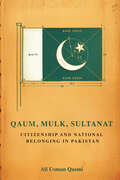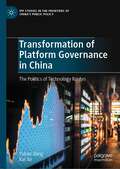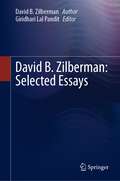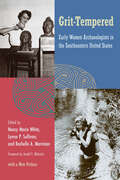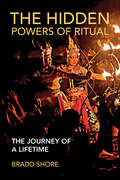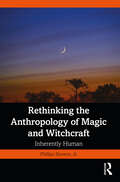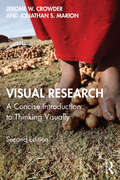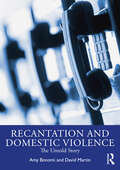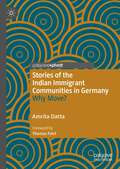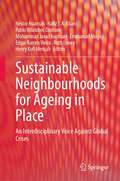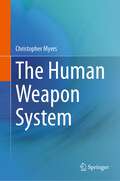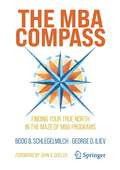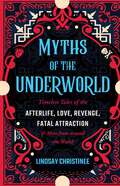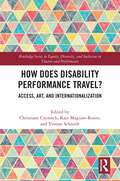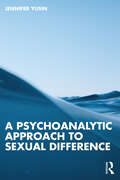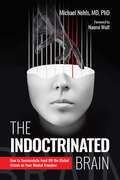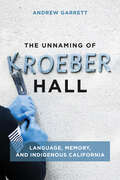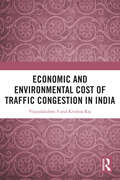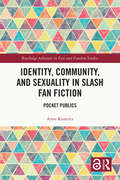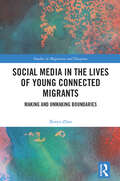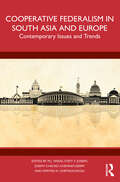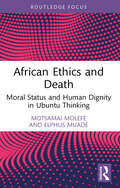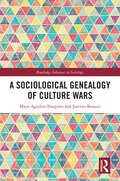- Table View
- List View
Qaum, Mulk, Sultanat: Citizenship and National Belonging in Pakistan (South Asia in Motion)
by Ali Usman QasmiAfter the trauma of mass violence and massive population movements around the partition of India and Pakistan in 1947, both new nation states faced the enormous challenge of creating new national narratives, symbols, and histories, as well as a new framework for their political life. While leadership in India claimed the anti-colonial movement, Gandhi, and a civilizational legacy in the subcontinent, the new political elite in Pakistan were faced with a more complex task: to carve out a separate and distinct Muslim history and political tradition from a millennium long history of cultural and religious interaction, mixing, and coexistence. Drawing on a rich archive of diverse sources, Ali Qasmi traces the complex development of ideas of citizenship and national belonging in the postcolonial Muslim state, offering a nuanced and sweeping history of the country's formative period. Qasmi paints a rich picture of the long, arduous, and often conflict-ridden process of writing a democratic constitution of Pakistan, while simultaneously narrating the invention of a range of new rituals of state—such as the exact color of the flag, the precise date of birth of the national poet of Pakistan, and the observation of Eid as a "national festival"—providing an illuminating analysis of the practices of being Pakistani, and a new portrait of Muslim history in the subcontinent.
Transformation of Platform Governance in China: The Politics of Technology Routes (IPP Studies in the Frontiers of China’s Public Policy)
by Yuhao Jiang Kai JiaThe admiration of science and technology and the emphasis on political stability are two sides of the same coin in China. Therefore, China is more likely to take aggressive measures to promote or inhibit platform development than the United States and the European Union. But the uncertainty in the decision-making process is worrisome and calls for a broader discussion of the multiple political consequences of technology.
David B. Zilberman: Selected Essays
by David B. ZilbermanThis book is a selection of articles by David Zilberman, a prolific author, whose tragic untimely death did not allow to finish many of his undertakings. Zilberman’s work represents a fresh word in the way of philosophizing or philosophy-building and the technique of modal methodology. This book comprises of thirteen independent articles that are not related by content. The point of thematic convergence of these articles is the way they reflect the new way of methodological thinking through the application and benefits of modalization or modal methodology that unfolds unbound possibilities of philosophic elaborations. By shifting constantly from one position to another, Zilberman disclosed the antinomicity of all types of thought. Such an approach led him to outline for the first time his major attempt to start creating not "systems" but "sums" of philosophies so that the philosophical activity would be able to re-emerge on the slopes of such "sums." The book can be used as a starting point of a discussion, especially in study of philosophy. We imagine it can be used in undergraduate classes on World Philosophies or Intercultural Philosophy courses. With that, it can serve as a useful resource for adding intercultural elements into Western-centered courses.
Grit-Tempered (Florida Museum of Natural History: Ripley P. Bullen Series)
by Nancy Marie White Lynne P. Sullivan Rochelle A. MarrinanThis volume documents the lives and work of pioneering women archaeologists in the southeastern United States from the 1920s through the 1960s. A landmark portrayal of pioneering women in science, reissued on its 25th anniversary Praise for the first edition: “Highly recommended for any archaeologist interested in the history of the discipline.”—Choice “An important addition to the history of southeastern archaeology, bringing to light the often undervalued or forgotten contributions of the many women who helped to make archaeology what it is today.”—Bulletin of the History of Archaeology “This is a needed history, providing details both mundane and critical, personal and professional, feminist and archaeological.”—Journal of the History of the Behavioral Sciences “Demonstrat[es] that each woman, regardless of how, when, or why she came to Southeastern archaeology, has made significant contributions to the field, clearing the path for women today to pursue successful careers in archaeology.”—North American Archaeologist “The regional focus lends an intimate and immediate quality to this series of biographical-historical narratives. . . . [It is] heartening to know that some among us have thought to capture these women’s stories for others to tell in the future and to provide a basis for better understanding how our roles and histories influence our work as archaeologists.”—Journal of Anthropological Research “These fascinating brief portraits, variously based on documents, interviews, or autobiographical statements, reveal much of the changing circumstances in the context of which women’s work must be understood.”—National Women’s Studies Association Journal “A readable book that provides a lot of interesting material on the history of Southeastern archaeology.”—Journal of Alabama Archaeology “A delight to read, often humorous, sometimes sobering. It has much to offer readers, ranging from the history of archaeology and the role of the WPA in southeastern archaeology, to an intimate view of careers of influential women in science, to discussions of the study of gender in history and archaeology. It is a volume to be read and shared.”—Arkansas Historical Quarterly “An easily read, thought-provoking book.”—St. Augustine Archaeological Association Quarterly Book Review Updated with a new preface on the 25th anniversary of its first publication, this volume documents the lives and work of pio
The Hidden Powers of Ritual: The Journey of a Lifetime
by Bradd ShoreAn illuminating overview of the development, benefits, and importance of ritual in everyday life, written by a leading cognitive anthropologist.The Hidden Powers of Ritual is an engaging introduction to ritual studies that presents ritual as an evolved form of human behavior of almost unimaginable significance to our species. Every day across the globe, people gather to share meals, brew caffeinated beverages, or honor their ancestors. In this book, Bradd Shore, a respected anthropologist, reaches beyond familiar &“big-R&” rituals to present life&’s humbler, overshadowed moments, exploring everything from the Balinese pelebon to baseball to family Zoom sessions in the age of Covid to the sobering reenactment rituals surrounding the Moore&’s Ford lynchings. In each ritual, Shore shows how our capacity to ritualize behavior is a remarkable part of the human story.Encompassing both the commonly unlabeled &“interaction rituals&” studied by sociologists and the symbolically elaborated sacred rituals of religious studies, Shore organizes his conception around detailed case studies drawn from international research and personal experience, weaving scholarship with a memoir of a life encompassed by ritual. A probing exploration that matches breadth with accessibility, The Hidden Powers of Ritual is a provocative contribution to ritual theory that will appeal to a wide range of readers curious about why these unique repetitive acts matter in our lives.
Rethinking the Anthropology of Magic and Witchcraft: Inherently Human
by Phillips Stevens, Jr.This book introduces students to the anthropology of magic and witchcraft, terms widely used but without widely accepted definitions. It takes a new approach to this area within the anthropology of religion, demonstrating that the bases for these beliefs and alleged practices are inherent in human cognition and psychology, even instinctual, and likely rooted in our evolutionary biology. It shows how magic and magical thinking are regular elements in people’s daily lives, and that understanding the components of the witchcraft complex offers surprisingly important insights into patterns of thinking and social behavior. The book reviews the many meanings of “magic” and “witchcraft,” and introduces the best anthropological meanings of the terms. The components of these beliefs are timeless and universal; this fact, and recent advances in the brain sciences, suggest that the principles of magic are derived from basic processes of human thinking, and the attributes of the witch derive from neurobiologically based fears and fantasies. The propensity for such beliefs probably had adaptive significance in the evolutionary development of the human species; they are inherently human. This book is intended to focus anew on the core concepts of magic, witchcraft, and the supernatural, while also serving as an introduction to the anthropology of religion for undergraduate and graduate-level courses.
Visual Research: A Concise Introduction to Thinking Visually
by Jerome W. Crowder Jonathan S. MarionVisual Research: A Concise Introduction to Thinking Visually 2nd Edition provides an accessible introduction to doing visual research in the social sciences. Beginning with ethical considerations, this book highlights the importance of thinking visually before engaging in visual research. Further themes involve creating, organizing, and using images and are presented so as to help readers think about and work with their own visual data. This fully updated second edition includes new case studies, updated discussions regarding the ethics of social media and online content, new technology and an expansion to include new material on museum, public and applied work. Concise and highly focused, Visual Research is an invaluable resource for visual, media, and communications students and researchers and others interested in visual research in the social sciences.
Recantation and Domestic Violence: The Untold Story
by Amy Bonomi David MartinRecantation and Domestic Violence empowers people and communities in improving their understanding of and skills in domestic violence cases that involve recantation. This book illustrates the precise interpersonal dynamics of recantation in criminal cases in which felony-level abuse has occurred. This book equips professionals in working more effectively with victims of domestic violence, their abusers, family members, and other supporters. Using the five-stage model of recantation, case examples, and audiotaped telephone conversations between abusers and their victims, it puts the reader directly in touch with what abusers say, how they say it, and how victims respond. This book is applicable to practitioners and research audiences in fields such as criminal law, family law, child custody, violence prevention, therapeutic interventions, medicine, nursing, psychology, social work, sociology, and behavioral economics.
Stories of the Indian Immigrant Communities in Germany: Why Move?
by Amrita DattaThis book tells the stories of Indian immigrants in Germany, including Blue Card holders and students categorized as highly skilled migrants, as well as others choosing shadow migration pathways in order to leave the country. It investigates their motivations for leaving India and choosing Germany as an immigration destination. Grappling with the stories of tech workers fleeing the pandemic, activists fleeing the witch hunting of the government, women escaping gender(ed) violence and queer people seeking freedom, this book uses reflexivity as an analytical tool. Investigation of their transcultural practices also reveals a general intent among Indians to create homes in Germany, despite several challenges to such efforts, including structural and everyday symbolic racism.
Sustainable Neighbourhoods for Ageing in Place: An Interdisciplinary Voice Against Global Crises
by Nestor Asiamah Hafiz T. A. Khan Pablo Villalobos Dintrans Mohammad Javad Koohsari Emmanuel Mogaji Edgar Ramos Vieira Ruth Lowry Henry Kofi MensahThis timely book provides an understanding of how an ageing population can maintain health in the ageing process in their preferred homes and neighbourhoods while coping with global crises of climate change events, infectious diseases, systemic violence, and radical or extreme industrialisation. It is the first-known volume to consider the four crises as health and social threats to healthy longevity from a sustainability perspective. The book is a collection of commentaries, theoretical frameworks, case studies, and empirical evidence that: (1) provides an analysis of how the crises affect neighbourhood attributes and the ability of residents to use them to maintain health while living in their preferred neighbourhoods, and (2) suggests potential interventions for enabling residents to utilise these attributes for health while living at home in contexts experiencing the crises. Contributions are authored by scholars and practitioners from various disciplines including public health, health care, architecture, engineering, human resources development, information technology, and finance. Among the topics covered:The Impact of Crises on Older Adults’ Health and Function: An Intergenerational Perspective A Behavioural Approach to Sustainable Neighbourhoods: A Philosophical Construction of a Friendly NeighbourhoodAssistive Technologies for Ageing in Place: A Theoretical Proposition of Human Development Postulates “Sustainable Ageing” in a World of CrisesSustainable Neighbourhoods for Ageing in Place: An Interdisciplinary Voice Against Global Crises serves as both a primary and secondary text particularly suited for post-graduate level study (e.g., MSc, PhD). Each chapter richly describes events, phenomena and models in a way that fits contemporary curricula for students and instructors in sociology, gerontology, architecture, environmental science studies, sustainability, ageing studies, and public health. Researchers in a broad range of disciplines can use the book as a research guide to design their studies based on models and insights described in its contents. With theoretical frameworks and recommendations from this book, stakeholders can understand what a sustainable neighbourhood is in the context of crises by presenting problems and solutions from different countries and disciplines.
The Human Weapon System
by Christopher MyersThis book discusses the differences between a human weapon system and a tactical athlete and what a human optimization program is. Furthermore, this book discusses and demonstrates how to put together a training program at an organizational level for the human weapon system. A systematic approach is presented and discussed, from initial analysis of the human weapon system to creating a multi-domain human performance optimization program. This book strives to familiarize the reader with the systematic approach that the author has utilized as an exercise physiologist in the Department of Defence over the past ten years. This book also explains how to utilize technology to individualize the human performance optimization program at an organizational level. The book discusses current technologies in power generation, measuring endurance, and nutrition, and also demonstrates to strength coaches and practitioners how to use these technologies and individualize optimization.
The MBA Compass: Finding Your True North in the Maze of MBA Programs
by Bodo B. Schlegelmilch George D. IlievLooking to pursue an MBA? The journey can be daunting, but fear not - this book is here to guide you every step of the way.With so many business schools and programs to choose from, it's important to know what you're looking for. That's where this book comes in. The authors help you understand the differences between full-time, modular, online, and executive MBAs, and provide expert advice on selecting the right program for your unique needs. But that's not all – the book also shows you how to make the most of your MBA experience, helping you to develop knowledge, skills, and personal growth. It explores the benefits of alumni associations and shows you how an MBA can be a game-changer for your career.And here's the best part - you don't need to spend a fortune on a Harvard or Stanford MBA to achieve your goals. The book introduces you to a range of high-quality MBA programs across the globe, from Europe to China, India to Latin America, that offer top-notch alternatives that won't break the bank.Whether you're a senior manager, entrepreneur, or fresh out of college, this book is the ultimate resource for anyone seeking to unlock their full potential with an MBA.
Myths of the Underworld: Timeless Tales of the Afterlife, Love, Revenge, Fatal Attraction and More from Around the World (Includes Stories about Hades and Persephone, Kali, the Shinigami, and More)
by Lindsay ChristineeImmerse yourself in stories of gods and goddesses of the underworld and explore how themes of death, love, and revenge are depicted in folklore and mythology by different cultures around the world.Myths of the Underworld is a vibrant collection of ten retellings of forbidden love, acts of vengeance, and naive attractions. Modernized for today&’s reader, these diverse stories span time and space. But while the cultures and traditions are varied, the themes woven throughout these tales reveal how the struggle to understand and accept death and all that comes with it is one that is quintessentially human. The ten different stories include: Hades and Persephone, the classic myth from Ancient Greece Kali, the Indian goddess (and wife of Shiva), known for her fierceness on the battlefield Anubis, the ancient Egyptian god of the underworld Mictlantecuhtli and Mictecacíhuatl, the lovers who ruled the Aztec underworld The Shinigami, Japanese spirits of the underworld Maman Brigitte, the Haitian intermediary of death Gamab, the Namibian god of fate who gifted rain to mankind Hel, the Norse overseer of the underworld Sedna, the Inuit goddess of the sea and the underworld The Sand Hills, the home of the dead for the Blackfeet Nation The tales in Myths of the Underworld are sure to captivate and enchant readers. Perfect for fans of mythology, romance, and fairy tales.
How Does Disability Performance Travel?: Access, Art, and Internationalization (Routledge Series in Equity, Diversity, and Inclusion in Theatre and Performance)
by Christiane Czymoch Kate Maguire-Rosier Yvonne SchmidtThis edited collection investigates the myriad ways in which disability performance travels in a globalized world. Disability arts festivals are growing in different parts of the world; theatre and dance companies with disabled artists are increasingly touring and collaborating with international partners. At the same time, theatre spaces are often not accessible, and the necessity of mobility excludes some disabled artists from being part of an international disability arts community. How does disability performance travel, who does not travel – and why? What is the role of funding and producing structures, disability arts festivals and networks around the world? How do the logics of international (co-)producing govern the way in which disability art is represented internationally? Who is excluded from being part of a touring theatre or dance company, and how can festivals, conferences, and other agents of a growing disability culture create other forms of participation, which are not limited to physical co-presence? This study will contextualize disability aesthetics, arts, media, and culture in a global frame, yet firmly rooted in its smaller national, state, and local community settings and will be of great interest to students and scholars in the field.
A Psychoanalytic Approach to Sexual Difference
by Jennifer YusinA Psychoanalytic Approach to Sexual Difference analyzes the concepts of sex and gender, showing how sexual difference is characterized by ongoing transformations of spatiality and body, and of essentiality and normativity. In this book, Jennifer Yusin presents a psychoanalytic study that engages with clinical cases, philosophies of sex and gender, and psychoanalytic writings about sexual difference. She deftly and accessibly analyzes Freud’s and Lacan’s work on feminine sexuality, Winnicott’s notion of the transitional object, and theories of sexuality and gender developed by Judith Butler and Monique Wittig, among others. Yusin starts with the question of how the lack of any essential definition of sexual difference affects subjectivity. She places an emphasis on the psychoanalytic experience and its effects upon how a subject experiences the difference between being a body and having a body. Following Lacan’s discovery of the Borromean knot structure of the unconscious and the work of the psychoanalyst Jean-Gérard Bursztein, Yusin continues developing subjective topology as a methodology. She also introduces and shows how sexual difference is linked to transformations of sex and body. Through this, Yusin highlights how it is necessary to reformulate sex, gender, and sexual identities in psychoanalytic theories and in the practice of psychoanalysis. She also speaks to the necessity of generating a new lexicon to help analysts speak about sexual difference in ways that do not perpetuate any essentialism or normativity on the topic. This book is essential reading for clinicians in psychoanalysis, mental health practitioners in the trans field, and academics working in gender theory, queer and trans studies, and feminist philosophies.
The Indoctrinated Brain: How to Successfully Fend Off the Global Attack on Your Mental Freedom
by Michael NehlsGlobal War on the Human Brain Throughout the world, mental capacity is declining, especially among young people, while depression rates are rising dramatically. Meanwhile, one in forty men and women suffers from Alzheimer's, and the age of onset is falling rapidly. But the causes are not being eliminated, quite the opposite. Can this just be coincidence? The Indoctrinated Brain introduces a largely unknown, powerful neurobiological mechanism whose externally induced dysfunction underlies these catastrophic developments. Michael Nehls, medical doctor and internationally renowned molecular geneticist, lays out a shattering chain of circumstantial evidence indicating that behind these numerous negative influences lies a targeted, masterfully executed attack on our individuality. He points out how the raging wars against viruses, about climate change, or over national borders are—more likely intended than not—fundamentally providing the platform for such an offensive against the human brain that is steadily changing our being and is aimed at depriving us of our ability to think for ourselves. But it is not too late. By exposing these brain-damaging processes and describing countermeasures that anyone can take, Nehls brings light and hope to this fateful chapter in human history. Nothing less will be decided than the question of whether our species can retain its humanity and its creative power or whether it will lose them irretrievably.
The Unnaming of Kroeber Hall: Language, Memory, and Indigenous California
by Andrew GarrettA critical examination of the complex legacies of early Californian anthropology and linguistics for twenty-first-century communities.In January 2021, at a time when many institutions were reevaluating fraught histories, the University of California removed anthropologist and linguist Alfred Kroeber&’s name from a building on its Berkeley campus. Critics accused Kroeber of racist and dehumanizing practices that harmed Indigenous people; university leaders repudiated his values. In The Unnaming of Kroeber Hall, Andrew Garrett examines Kroeber&’s work in the early twentieth century and his legacy today, asking how a vigorous opponent of racism and advocate for Indigenous rights in his own era became a symbol of his university&’s failed relationships with Native communities. Garrett argues that Kroeber&’s most important work has been overlooked: his collaborations with Indigenous people throughout California to record their languages and stories.The Unnaming of Kroeber Hall offers new perspectives on the early practice of anthropology and linguistics and on its significance today and in the future. Kroeber&’s documentation was broader and more collaborative and multifaceted than is usually recognized. As a result, the records Indigenous people created while working with him are relevant throughout California as communities revive languages, names, songs, and stories. Garrett asks readers to consider these legacies, arguing that the University of California chose to reject critical self-examination when it unnamed Kroeber Hall.
Economic and Environmental Cost of Traffic Congestion in India
by Vijayalakshmi S S Krishna RajThis book explores one of the most prevailing problems of the contemporary urban world, i.e. traffic congestion and its economic, environmental, and health implications. Generally viewed as an urban menace, the problem of traffic congestion has huge economic implications, which are often overlooked by urban planners. This book examines and quantifies the costs and adverse consequences and of traffic congestion, which include emissions, loss of productive hours, fuel wastage, and the adverse effects on the health of commuters, among others. It provides a comprehensive and scientific understanding of the underlying problems of traffic gridlocks by analyzing empirical evidence from Bengaluru, a city in South India. It also offers solutions and highlights innovative measures that draw from both economic and engineering perspectives to counter and reduce the tangible and intangible costs of traffic conjestion. This book will be of interest to both academic and non-academic readers of economics, environmental economics and econometrics, transport economics, urban planning, transport geography, as well as planners and policy makers.
Critical Review of the Abe Administration: Politics of Conservatism and Realism (Routledge Contemporary Japan Series)
by Yoichi Funabashi Koji NakakitaThe second Abe administration, which lasted for seven years and eight months, turned out to be the longest administration in Japan’s constitutional history. What factors contributed to its remarkable longevity? What accomplishments and enduring legacies did this administration achieve during its tenure? Originally published in Bungeishunju in Japanese, this book examines policies pursued by the administration and its governance based on over 50 investigative interviews with key figures in the administration, including former Prime Minister Shinzo Abe. The contributors cover nine major policies, including economic policy, diplomacy and security, work style reform, trade liberalization, and historical issues, and explore why a specific policy was chosen at that time, who made that decision, and on what grounds. Reviewing such decision-making processes sheds light on the issue of governance. Consequently, this book also analyses the administration’s distinctive style of governance, such as strong leadership from the Prime Minister’s Office, ability to navigate party politics, and overwhelming victories in national elections. An essential for scholars and students in the fields of public administration, public policy, Japanese studies, and Asian Studies.
Identity, Community, and Sexuality in Slash Fan Fiction: Pocket Publics (Routledge Advances in Fan and Fandom Studies)
by Anne KustritzThis book explores slash fan fiction communities during the pivotal years of the late 1990s and early 2000s as the practice transitioned from print to digital circulation. Delving into over ten years of online and in-person ethnography, the book offers an in-depth examination of slash fan fiction – original stories written by and circulated within female-centered communities about same-sex characters borrowed from previously published sources – to document the history of a feminist, queer media subculture whose infrastructure, creativity, and ways of life are often obscured in dominant histories of the internet’s development and by the contemporary focus on industry-friendly but often misogynist digital fan subcultures. Arguing that online slash communities created an alternate public space that provided opportunities for unanticipated encounters with a wide range of complex sexual, relational, and political practices, the book contends that slash thereby added to readers’ tools for experiencing and thinking about pleasure and ways of living by forming a “pocket public,” that is a digital space public enough to be found and protected enough to shield participants from harassment and censorship. This insightful and comprehensive study will interest students and scholars working in the areas of media studies, literary studies, anthropology, new media, audience communities, convergence culture, fan studies, women’s studies, and queer studies. Introduction of this book is freely available as a downloadable Open Access PDF at http://www.taylorfrancis.com under a Creative Commons [Attribution-Non Commercial (CC-BY- NC)] license. Funded by Social Sciences and Humanities Research Council of Canada (grant 435-2019-0691).
Social Media in the Lives of Young Connected Migrants: Making and Unmaking Boundaries (Studies in Migration and Diaspora)
by Xinyu ZhaoDigital media are a key part of everyday social life for international migrants. However, we don’t know enough about how these migrants critically understand and cope with the cultures and infrastructures of ubiquitous connectivity while on the move. Social Media in the Lives of Young Connected Migrants explores and theorises what it means for young migrants to live in a digital age. Presenting a richly detailed analysis of Chinese international students’ everyday social media practices, the book unravels the meanings of digital connectivity in general and how contemporary mobile young generations respond to such changes. Drawing on ethnographic and interview data, this book highlights the enabling aspects of connective media in migration journeys and shows how and why young Chinese migrants manage or even resist being connected. With close attention to diasporic, intercultural, family, and professional migrant identities and relationships, the author provides a nuanced account of living with digital media in everyday settings. Focusing on the boundary practices associated with social media, the book offers a unique analytical framework through which to capture the complex intersections of digital communication technologies and migrant social life. This volume will appeal to students and scholars interested in researching Chinese diasporas, digital migration, and youth cultures.
Cooperative Federalism in South Asia and Europe: Contemporary Issues and Trends
by M. J. Vinod Stefy V. Joseph Joseph Chacko Chennatuserry Dimitris N. ChryssochoouThis book explores the challenges, opportunities, and trends impacting the working of federations in South Asia and Europe. It deliberates on the changing socio-economic realities, challenges facing the existing structures of governance, degrees of consociationalism, and the growing aspirations of people in South Asia and Europe. Through case studies from Greece, Germany, Austria, Switzerland, Spain, France, Sri Lanka, Pakistan, Nepal, Maldives, Bhutan, and India, the volume focuses on critical issues relating to cooperative federalism – its complexities, institutional dilemmas, and trends in South Asia and Europe. It discusses a variety of themes relevant to Cooperative Federalism including federal-state relations; cooperative governance; constitution; multiculturalism, fiscal relations, democratization, devolution of powers, consociationalism, and global citizenship in South Asia and Europe. The book further emphasizes the need to strike a balance between the federal government and the constituent units in these two regions. Topical and lucid, this book will be of interest to teachers, scholars, and researchers of political science, comparative government and politics, federalism, South Asian politics, European politics, governance studies, and political studies.
African Ethics and Death: Moral Status and Human Dignity in Ubuntu Thinking (Routledge Studies in African Philosophy)
by Motsamai Molefe Elphus MuadeThis book analyzes the concepts of moral status and human dignity in African philosophy and applies them to the moral problems associated with death. The book first challenges the criticism and rejection of moral status in African philosophy and then continues to consider how moral personhood is defined in African ethical theories, investigating which entities have full moral status or moral personhood and are therefore worthy of full ethical consideration. It then applies this theory to the problems associated with death. In the medical context, will an African theory of moral status permit or forbid euthanasia? Do we have moral obligations towards dead human bodies? Overall, the book provides an important African axiological contribution to debates on global ethics and moral philosophy. Providing an important overview of the ethical problems associated with the biological fact of death, this book will be of interest to researchers across the fields of philosophy and African studies.
A Sociological Genealogy of Culture Wars (Routledge Advances in Sociology)
by Maya Aguiluz-Ibargüen Josetxo BeriainThis book analyzes the culture wars as those struggles for the monopoly of the legitimate representation of the world in the normative elucidation of controversial issues linked to values. Public culture in this context would consist of a set of complex classificatory systems of symbols and meanings that constitute a semantic field in permanent dynamic tension. In this work we analyze a whole series of lines of cultural conflict such as the social and semantic genesis of the different forms of “culture war” from the thesis of “modern polytheism” pointed out by Max Weber at the beginning of the 20th century to the national culture wars and the current global culture wars; the social production of truth and the clash with the epistemological tribalisms; the struggles between the new warrior gods, daimons and demons that emerge in modern societies; the struggles of fusion and fission on the symbolic battlefield of “Europe”; the struggles between “pioneers” and “gatekeepers” to define the limits of human nature; the struggles between utopias and dystopias that colonize the present future. This book will be of great help to anybody looking for key interpretations on the nature and structure of modern conflicts in contemporary societies.
Dispossession: Anthropological Perspectives on Russia’s War Against Ukraine (Anthropology of Now)
by Catherine WannerThis volume examines Russia’s war on Ukraine. Scholars who have lived through the Russian invasion or who have conducted ethnographic research in the region for decades provide timely analysis of a war that will leave a lasting mark on the twenty-first century. Using the concept of dispossession, this volume showcases some of the novel ways violence operates in the Russian-Ukrainian war and the multiple means by which civilians, within the conflict zone and beyond, have become active participants in the war effort. Anthropological perspectives on war provide on-the-ground insight, historically informed analysis, and theoretical engagement to depict the experiences of dispossession by war and the motivations that drive the responses of the dispossessed. Such perspectives humanize the victims even as they depict the very inhumanity of war. Dispossession is geared towards upper-level undergraduate and graduate students, scholars, and the general reader who seeks to have a deeper understanding of the Russian-Ukrainian war as it continues to impact geopolitics more broadly.
